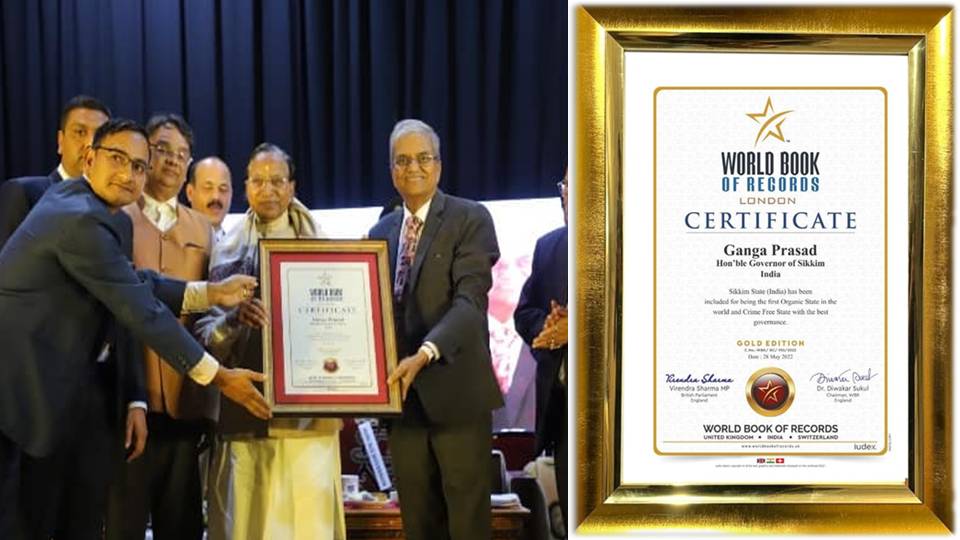Mass consumption & mass production have not only forced the farmers to use chemicals & fertilizers but have also ignited environmental degradation & pollution. Sudden & uneven environmental phenomena like drought, flood, landslide, cyclones, earthquakes, or flash rains are the result of the climate change induced by consumerism in the world.
Himalayan states have been bestowed with natural beauty but their biodiversity is ecologically sensitive. In the modern age of commercialism, it becomes very important to keep these sensitive regions intact in biodiversity. Following the ancient principle of society & nature, Sikkim, a small Himalayan State of India, adopting organic agricultural practices has set an example for the world. Further, the non-conflicting community understanding has also made the state a crime-free state in India.
World’s first organic state
A UK-based international certification organization, World Book of Records has recognized Sikkim as the “world’s first organic state”. The certification program held in the presence of Sikkim Governor Ganga Prasad at the capital city Gangtok also recognizes the beautiful State of Sikkim as a “crime-free state” of India.
The certificate declares “Sikkim State (India) has been included for being the first Organic State in the world and Crime- Free State with the best governance”.
Also Read: Sikkim to implement Universal Basic Income by 2022
Sikkim Organic Mission
The mission started in 2010 intending to “convert Sikkim into a totally Organic State by 2015 where any agriculture produce from the State is grown using organic fertilizer and healthy for consumption”. It is also pertinent to note that the State followed a democratic model to implement the policy where it voluntarily adopted to go organic.
Organic farming is a type of agriculture that avoids the use of synthetic fertilizers, pesticides, and other chemical inputs. Organic farming systems rely on crop rotation, crop residues, animal manures, legumes, green manure, bio-fertilizers, and bio-pesticides. So, it becomes important for the State machinery to solve the dual problem, which is the supply of organic inputs and demand for organic products, in the mission.
Also Read: Overview of Waste Management in Sikkim
So with the help of APEDA (Agriculture and Processed Food Products Export Development Authority) and the central government scheme PKVY (Paramparagat Krishi Vikas Yojna), they commercialized the organic products. This enhanced the demand and sustained the agro-economic model. Further, the state machinery actively participated in maintaining the supply of organic inputs like bio-fertilizers (Azospirillum, Azotobacter, Mycorrhiza fungi, Rhizobia) and bio-pesticides (ladybugs, wasps, snakes, owls, sparrows, and cats).
The chemical fertilizers contain lots of nitrates and phosphates which increase the soil acidity and further harm the environment. The use of bio-fertilizers improves the soil structure & soil’s water-holding capacity.
The organic agricultural practices have not only helped the state in preserving the ecological sensitivity of the Himalayan state but have also promoted ecotourism in the State. The export of organic products and increased tourist numbers helped the state to balance both the economy and ecology. For such a policy initiative, in 2018, the FAO (Food and Agricultural Organization) had awarded the state with the Future Policy Gold Award.
Crime Free State
Social inequalities and conflicting policies force common people towards crime. But when states promoting the good governance model try to work towards growth, these conflicting and uneven developmental conditions do not arise.
Sikkim’s good governance policy in the economy and environment promoted the equitable distribution of wealth. Further, the sustainable economic model provided everybody with equal opportunity to grow which ultimately made the state crime-free.
Sikkim’s economic and ecological policy made the state both prosperous and environmentally sustainable. The State worked on its strength of low population and unique ecology and the dividend of the investment is overall prosperity. Sikkim has set the example for every state in India to work on its unique biome and promote the allied activities around it.
